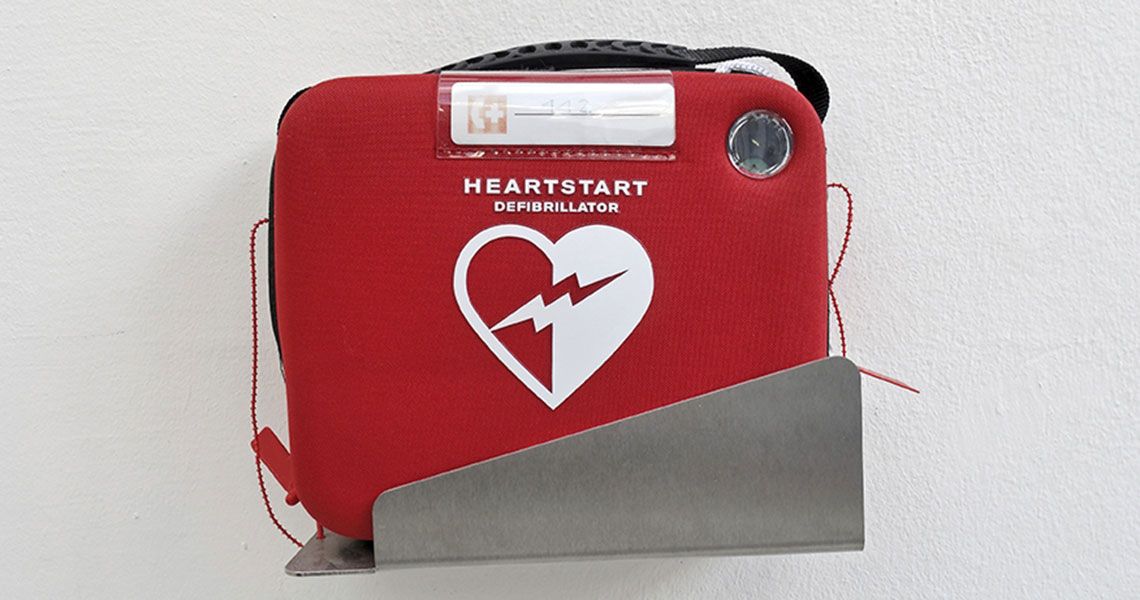Sudden cardiac arrest (SCA), when the heart unexpectedly stops beating, can strike anywhere, anytime. While those with a history of heart disease — such as a previous cardiac arrest, coronary artery disease, or arrhythmia — are most at risk, anyone, even healthy adults or young athletes can experience SCA without warning. According to a 2015 Institute of Medicine Report, each year almost 400,000 men, women, and children will experience an out-of-hospital sudden cardiac event, with average survival rates below 6 percent.
Those devastating figures are why for the past five years Jonathan Reiner, M.D., professor of medicine at GW’s School of Medicine and Health Sciences, and director of the GW Hospital’s Cardiac Catheterization Lab, has been working to put Automated External Defibrillators (AEDs) in the hands of good Samaritans willing to make a difference.
The bill, HR 4152 – the Cardiac Arrest Survival Act of 2015, is co-sponsored by Pete Olson (R–Texas) and Gerry Connoly (D–Va.), and currently making its way through the House Energy and Commerce Committee, and earlier this year it was referred to the Subcommittee on Health. According to Reiner, the bill has received widespread support from everyone he’s met with, but things on Capitol Hill are never as straight forward as they seem. This is the third time the bill has been introduced.
An AED is a computer, explains Reiner, designed to detect a faulty heart beat and deliver an electric shock to try to restore a normal heart rhythm. Once you place the device’s patches on the patient’s chest, the computer analyzes the heart rhythm. It will not discharge a shock if it determines the heart is not within a “shockable rhythm.”
“It’s essentially a fool-proof device,” he says. “The only way to make mistake is by not trying to use a defibrillator on somebody who is having a cardiac arrest.
“The clock is ticking,” adds Reiner. “If you resuscitate somebody with a defibrillator shock within one minute of their cardiac arrest, just 60 seconds, the data shows that almost everyone survives.” If the time between cardiac arrest and defibrillation passes the 10-minute mark, however, the effort is basically futile. In those 10 minutes, says Reiner, “survival rates go from virtually everyone to almost nobody.”
“Over the years what I’ve come to understand,” says Reiner, who specializes in interventional cardiology, cardiac catheterization, and heart attack treatment, “is that the most important factor among the people who survive SCA is not the quality of the hospital or the skill of their doctors, it’s just plain luck; that they were lucky enough to have a cardiac arrest in close proximity to someone willing and able to defibrillate them quickly.”
In June 2009, Reiner and the GW Heart and Vascular Institute launched ReStart DC in an effort to make defibrillators more available across Washington, D.C. The group raised money and purchased the portable devices for distribution in areas of the city where a lot of people congregate.
“We went to churches, boys and girls clubs, D.C. public libraries, the Salvation Army, and we made them an offer they couldn’t refuse,” recalls Reiner. ReStart DC offered to train staff at the local groups and give them free defibrillators. “All they had to do was accept them.” Ultimately, the program distributed 150 defibrillators. Next, ReStart DC began looking beyond the District’s boundaries, and that, Reiner says, is when they discovered a broader problem. The laws involving the use of AEDs were different in every state.
In early 2000, the American Heart Association lobbied for laws governing liability protections for businesses and organizations who wanted to initiate an AED program. They were successful. The unintended consequences of that achievement, however, made it something of a hollow victory. Instead of life-saving defibrillators available across the land within a minute or two of anyone in need, the country ended up with a patchwork of laws, each state with it’s own unique requirements and nuances. The resulting ambiguity and confusion means businesses operating in multiple states often decide it is easier to simply not offer the life-saving devices.
Reiner decided to try and unify those laws so that hotel chains or hardware stores or supermarkets that operated in multiple markets could provide access to AEDs under common liability regulations, and businesses would be assured of the minimum requirements needed to be protected from liability.
“All the bill says is that regardless of what a state’s regulations are, as long as you have a working defibrillator in your place of business you are protected; and if you are a rescuer, as long as you are using the device with good intent to try to save someone’s life you are also protected.”
Reiner considers AEDs to be the health care equivalent of a fire extinguisher, “except it’s easier to use than a fire extinguisher because it tells you what to do.” If fire extinguishers were bound by the same licensing, training, and oversight as AEDs, argues Reiner, they never would have become part of our public landscape. Instead, if a fire broke out most businesses would avoid the liability risk and let their buildings burn while waiting for the fire department to come.
“This is a bill that doesn’t cost the government anything and that doesn’t obligate businesses to do anything they don’t want to do already, but it has the affect of saving thousands of lives,” he says. “The goal is to resuscitate a patient before EMS even arrives. Even a small increase in the survival rate equates to a lot of people.”



